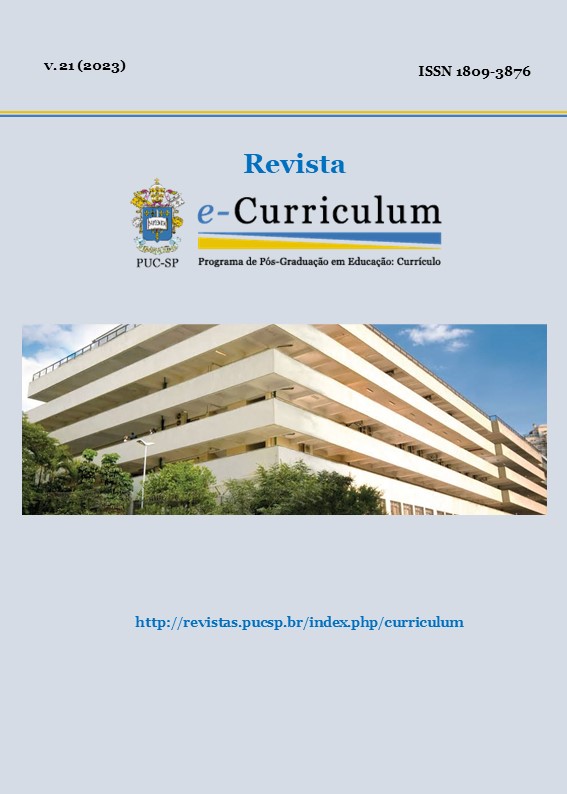The research object as temporality and autobiography
DOI:
https://doi.org/10.23925/1809-3876.2023v21e59741Keywords:
curriculum; autobiography; currere.Abstract
What I bring to you today is the account of the construction of a research itinerary that, like a lego, is built up over the course of studies whose direction is not always immediately intuited. The texts, and this seems to me to be the way of doing scientific work in Education, bring up questions that are not necessarily in the narrative studied, but in the encounter, from a set of very unique circumstances, with the narratives we are faced with. throughout the study. The theme of autobiography, as a methodology, stands out in the context of the American reconceptualization movement that, in a movement analogous to that already described by Bachelard, arises in controversy with the current educational thought, namely, the Tylerian education. Willian F. Pinar, in this context, develops the currere method, which inspires this article. Therefore, the invitation I make to you through this text is to try to think about the non-subject, drawing the self as a singular operational mode of responsiveness, of the act of responding to the interpellations of the world. From my point of view, our most important task as researchers/educators these days is to contribute, if not to the end, to a drastic reduction of social inequalities. In this movement of trying to replace individualism with interdependence (BUTLER, 2021b), my object is my own magisterium that mixes existence and science, its paradoxes, its aporias.
References
BACHELARD, Gaston. O novo espírito científico. Lisboa: Edições 70, 1986.
BULCÃO, Marly. O racionalismo da ciência contemporânea: uma análise da epistemologia de Gaston Bachelard. 2. ed. Londrina: UEL, 1999.
BUTLER, Judith. Os sentidos do sujeito. Belo Horizonte: Autêntica, 2021a.
BUTLER, Judith. A força da não violência. São Paulo: Boitempo, 2021b.
CONDURU, Roberto. Pérolas negras, primeiros fios: experiências artísticas e culturais nos fluxos entre África e Brasil. Rio de Janeiro: EdUERJ, 2013.
DERRIDA, Jacques. Força da lei. São Paulo: Martins Fontes. 2010.
LATOUR, Bruno. Ciência em ação: como seguir cientistas e engenheiros sociedade afora. São Paulo: UNESP, 2000.
LEMOS, Guilherme Augusto Rezende. O sujeito descentrado e a educação como estética. 2014. Tese (Doutorado em Educação) – Universidade Estadual do Rio de Janeiro, Rio de Janeiro, 2014.
LEMOS, Guilherme Augusto Rezende. A educação escolar e o imprevisto. Hispanista (edição em português). v. XVIII, p. 1-17, 2017. Disponível em: www.hispanista.com.br/artigos autores e pdfs/557.pdf. Acesso em: 24 out. 2022.
LOPES, Alice Casimiro; MACEDO, Elizabeth. Teorias de currículo. São Paulo: Cortez, 2011.
LYOTARD, Jean-François. A condição pós-moderna. 9. ed. Rio de Janeiro: José Olympio, 2006.
MACEDO, Elizabeth. Base Nacional Curricular Comum: a falsa oposição entre conhecimento para fazer algo e conhecimento em si. Educação em Revista, v. 32, n. 2, p. 45-68, 2016. Disponível em: https://redalyc.org/journal/3993/399361529004/html/. Acesso em: 09 out. 2022.
MACEDO, Elizabeth. Mas a escola não tem que ensinar? Conhecimento, reconhecimento e alteridade na teoria do currículo. Currículo sem fronteiras, v. 17, p. 539-554, 2017. Disponível em: http://www.curriculosemfronteiras.org/vol17iss3articles/macedo.pdf. Acesso em: 09 out. 2022.
MARCONDES, Danilo. Em defesa de uma concepção pragmática de linguagem. Gragoatá. Niterói, II. 18, p. 11-29, 1. sem. 2005. Disponível em: https://periodicos.uff.br/gragoata/article/view/33273. Acesso em: 24 out. 2022.
MILLER, Janet L. Sounds of silence breaking. New York: Peter Lang, 2005.
MILLER, Janet L. Teorização do Currículo como antídoto contra a cultura da testagem. Revista e-Curriculum, São Paulo, v. 12, n. 3, p. 2043-2063, dez. 2014. Disponível em: https://revistas.pucsp.br/index.php/curriculum/article/view/21679. Acesso em: 24 out. 2022.
OLIVEIRA, Gustavo Gilson Sousa de. Provocações para aguçar a imaginação/invenção analítica: aproximações entre a teoria política do discurso e análise do discurso em educação. In: LOPES, Alice Casimiro; OLIVEIRA, Anna Luiza A. R. Martins de; OLIVEIRA, Gustavo Gilson Sousa de (Orgs.). A teoria do discurso na pesquisa em educação. Recife: UFPE, 2018. p. 169-216.
PINAR. Willian F. O que é a teoria de currículo? Porto: Porto, 2007.
Downloads
Published
How to Cite
Issue
Section
License
Copyright (c) 2023 Revista e-Curriculum

This work is licensed under a Creative Commons Attribution 4.0 International License.
Os autores concedem à revista todos os direitos autorais referentes aos trabalhos publicados. Os conceitos emitidos em artigos assinados são de absoluta e exclusiva responsabilidade de seus autores.Todo o conteúdo da Revista e-Curriculum é aberto para acesso público, propiciando maior visibilidade, alcance e disseminação dos trabalhos publicados.











